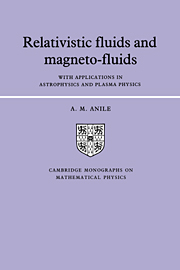Book contents
- Frontmatter
- Contents
- Preface
- 1 Introduction
- 2 Mathematical structure
- 3 Singular hypersurfaces in space-time
- 4 Propagation of weak discontinuities
- 5 Relativistic simple waves
- 6 Relativistic geometrical optics
- 7 Relativistic asymptotic waves
- 8 Relativistic shock waves
- 9 Propagation of relativistic shock waves
- 10 Stability of relativistic shock waves
- References
- Index
10 - Stability of relativistic shock waves
Published online by Cambridge University Press: 06 January 2010
- Frontmatter
- Contents
- Preface
- 1 Introduction
- 2 Mathematical structure
- 3 Singular hypersurfaces in space-time
- 4 Propagation of weak discontinuities
- 5 Relativistic simple waves
- 6 Relativistic geometrical optics
- 7 Relativistic asymptotic waves
- 8 Relativistic shock waves
- 9 Propagation of relativistic shock waves
- 10 Stability of relativistic shock waves
- References
- Index
Summary
Introduction
The stability of relativistic shock waves is a fundamental problem of relativistic fluid dynamics and its resolution might have interesting consequences for astrophysics, plasma physics, and nuclear physics. In particular, in models of gravitational collapse and supernova explosions, the bounce shock traverses regions of varying state equations. The stability of this shock is essential for the overall validity of the model. Present numerical codes, being restricted to spherical symmetry, are not capable of detecting these kinds of instabilities. In high-energy heavy ion collisions, the formation of a quark-gluon plasma might occur through a relativistic shock and its instability might signal the transition (e.g., by observing shock splitting; Barz et al., 1985).
In nonrelativistic fluid dynamics the stability of plane shock fronts has been investigated by D'Yakov (1956) and Erpenbeck (1962), using linear stability methods.
The problem has also been studied by Gardner (1963) in the framework of shock splitting methods and more recently by Fowels (1981, and references therein) who considered the stability of the front against an impinging acoustic wave from behind. By requiring that the perturbations decay sufficiently fast at infinity these authors obtained restrictions on the equation of state of a fluid in order for it to sustain plane fronted shock waves.
The linear stability analysis has been extended by Gardner and Kruskal (1964) to the fast magnetoacoustic shock and by Lessen and Deshpande (1967) to the slow magnetoacoustic shock.
- Type
- Chapter
- Information
- Relativistic Fluids and Magneto-fluidsWith Applications in Astrophysics and Plasma Physics, pp. 289 - 324Publisher: Cambridge University PressPrint publication year: 1990

